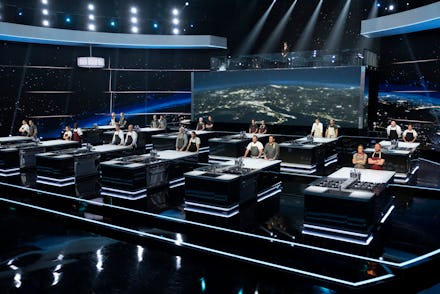‘The Final Table,’ Netflix’s newest cooking show, may finally make food TV inclusive

Food competition shows are a dime a dozen in 2018.
Somewhere between reruns of MasterChef, Top Chef, The Great British Baking Show, Chopped, Hell’s Kitchen, Worst Cooks in America and so many others, they begin to run together.
But on Tuesday, Netflix dropped the trailer for its contribution to the category, which, it hopes, just might break the mold. The Final Table, a culinary competition that spotlights chefs, dishes and techniques from around the world, will go live on Netflix on Nov. 20.
How The Final Table stands out might not seem apparent. The format, in many ways, is drearily familiar: The competition pits 24 chefs, divided into 12 teams of two, against one another on a set reminiscent of Iron Chef’s Kitchen Stadium, complete with a live studio audience. There’s dramatic lighting and dramatic music, jazzed up with metallic, knife-inspired sound effects. Celebrity guest judges abound, from comedians Dax Shepard and Hasan Minhaj to former Victoria’s Secret model Alessandra Ambrosio.
And yet, spliced into each episode is artful, color-saturated footage that leans more toward Chef’s Table than MasterChef. We get a sense of it in the trailer as some bold-faced name chef-judges are introduced — Enrique Olvera of Mexico, the United States’ Grant Achatz and the United Kingom’s Clare Smyth — plus some teary backstories of the cheftestants. In the food television universe, where aspirational programs and fast-paced competition shows tend to exist at opposite poles, this appears to be a stab at bringing the two closer together.
But where the The Final Table most drastically differs from others of its ilk might be its intended audience. Unlike shows such as MasterChef and Top Chef, which have been spun off into myriad international versions tailor made to each market, there will only be one version of The Final Table, albeit dubbed and subtitled for non-English-speaking markets. As is standard for the digital platform, the entire season will go live at once, airing simultaneously in 190 countries.
The implication is huge: Conceivably, people around the world could be invested in the same show at the same time. Think Eurovision or the Olympics, but for food. And if food has the power to bring people together, then perhaps food television can, too.
The implication is huge: Conceivably, people around the world could be invested in the same show at the same time. Think Eurovision or the Olympics, but for food. And if food has the power to bring people together, then perhaps food television can, too.
“In terms of the concept of the show and what it delivers, it undoubtedly is the biggest food competition show the world has ever seen,” co-executive producer Robin Ashbrook, who also created MasterChef and MasterChef Junior, said. The featured dishes, he said, reflect a shifting attitude toward flavors and cuisines that favor globalism over provincialism.
“You can eat French food in Mumbai, and Italian food in Japan and Singapore,” Ashbrook said. “It’s really kind of very exciting that as the food world shrinks, we can all celebrate it. ... Thirty million people might watch this show in India — the idea that they’ve never eaten anything but Indian food is antiquated.”
The notion of representation — of cuisines, ethnicities and cultures — also sets The Final Table apart. The cheftestants, many of them with Michelin stars to their names, hail from a total of 14 countries that span six continents, and episodes will center on the cuisines of nine different countries. The thinking, Ashbrook said, is that the food and talent of those destinations deserve recognition equal to that traditionally afforded to Western European, classical French-leaning cuisines.
It’s a move that’s in line with a growing awareness of the historic underrepresentation of women, people of color and other marginalized groups in the food world, evident, for instance, in the James Beard Foundation’s recent rejiggering of its annual awards to prioritize inclusivity. Plus, global cuisine simply makes for good television.
“To be a great chef these days, you can’t be a master of one specific cuisine,” Ashbrook said. “You have to be able to master a few.”